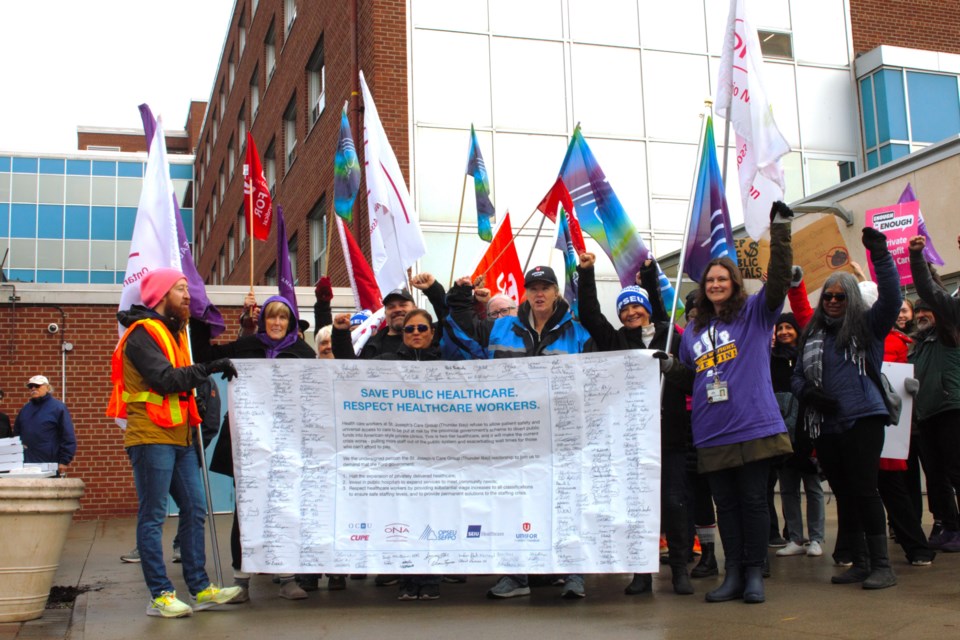THUNDER BAY — A coalition of health care unions brought their campaign against health care privatization to St. Joseph’s Hospital Friday.
Building on a similar rally targeting Thunder Bay’s regional hospital earlier this year, the unions urged St. Joseph’s Care Group to join them in opposing Bill 60, recent legislation that hands private clinics a larger role in Ontario’s health system.
St. Joseph's Care Group remained silent on the issue Friday, accepting a signed petition from workers but declining to answer questions on its position.
The Ontario Hospital Association, which represents hospital operators including St. Jo’s, supported Bill 60, saying it will help reduce wait times for patients.
Ontario’s five largest health unions — Ontario Nurses' Association, Unifor, OPSEU, CUPE's Ontario Council of Hospital Unions, and SEIU Healthcare — don’t share that confidence, joining forces to fight the legislation.
On Friday, those unions brought the campaign to St. Joseph’s Hospital, where they represent workers including nurses, personal support workers, clinical staff, and social workers.
In a joint statement, the unions said they’re seeking “a firm commitment from St. Joseph's Care Group management that it will defend public delivery of healthcare and fight all steps towards privatization.”
The Ford government passed Bill 60, also known as the Your Health Act, in May over objections from opposition parties and most major health unions.
The legislation allows both for-profit and non-profit companies to establish private clinics in Ontario for diagnostic imaging and procedures like cataract surgeries and hip and knee replacements.
Critics have argued allowing for-profit clinics will lure staff away from already-struggling public hospitals and incentivize “upselling” of health services – and over the longer term, pave the way for a two-tiered system where the wealthy are served first.
Sharol Bachmeier, a longtime registered nurse at St. Joseph’s Hospital who heads the ONA’s bargaining unit there, sees Bill 60 as just the latest in a series of moves that have embedded the profit motive deeper into Ontario’s health system.
She believes steps like private home care and an increasing reliance on contracted agency nurses ends up hurting the system and costing Ontarians more in the long run.
"There's already been a very big, big impact,” she said. “There's a lot more use of agency nurses, which is actually putting a lot of [costs] on our public system, as well.”
“There actually is a significant impact that's happening right now with the agency's staffing and with private clinics. A lot of the nurses actually are leaving the bargaining unit to go to these private clinics and to be able to make more work temporarily, doing contracts.”
“It is just creating chaos that doesn't need to be created, if we actually invest in our public health care system, if we support our nurses to be retained and help them work in the system.”
Tanya Stout, a clerical worker in the hospital’s seniors outpatient department and SEIU member, said private clinics are understandably appealing for workers.
“As human beings, we all want to go where we could get paid more,” she said. “Lots of times it's going to be the newer staff that are wanting to get a higher wage – with this inflation, this cost of living, it's going to be the younger people that are moving to these private clinics.”
“We're missing out on the new blood that is going to be learning from our experienced [staff]. I just feel it's going to negatively impact the system in ways we can't even foresee yet.
Stout worries that comes as the health system is already contending with staff shortages.
“For clerical specifically, we're finding it very hard to get new blood into our system. It's very hard to find the correct qualifications, not many applications, retention’s a bit of an issue. We're seeing the start of it already just from COVID, and now facing the threat of looming privatization, which makes it even worse.”
The Ford government has defended the legislation as a way to reduce long wait lists, and promised patients at private clinics will not have to pay out of pocket.
Bill 60 includes a clause stating doctors at private clinics cannot turn patients away for choosing to pay with their OHIP card.
The government had categorically denied prior to the 2022 election that the use of private hospitals would be expanded.
Despite the Ford government’s firm majority at Queen’s Park, the unions have said they hope to force it to back down and repeal the bill in the face of public pressure.
St. Joseph’s Care Group vice-president of people and mission Adam Shaen briefly greeted workers at the rally Friday, accepting a signed petition.
The organization did not grant a TBnewswatch interview request, instead sending a statement that did not answer questions about how it believes Bill 60 will impact the hospital.
“An important part of our culture is to always listen to what our staff have to say, not just during the easy times but also when the conversation is more difficult,” Shaen said in the statement. “It’s a relationship of respect, and it’s what has helped us to continue to serve our community for almost 140 years.”
